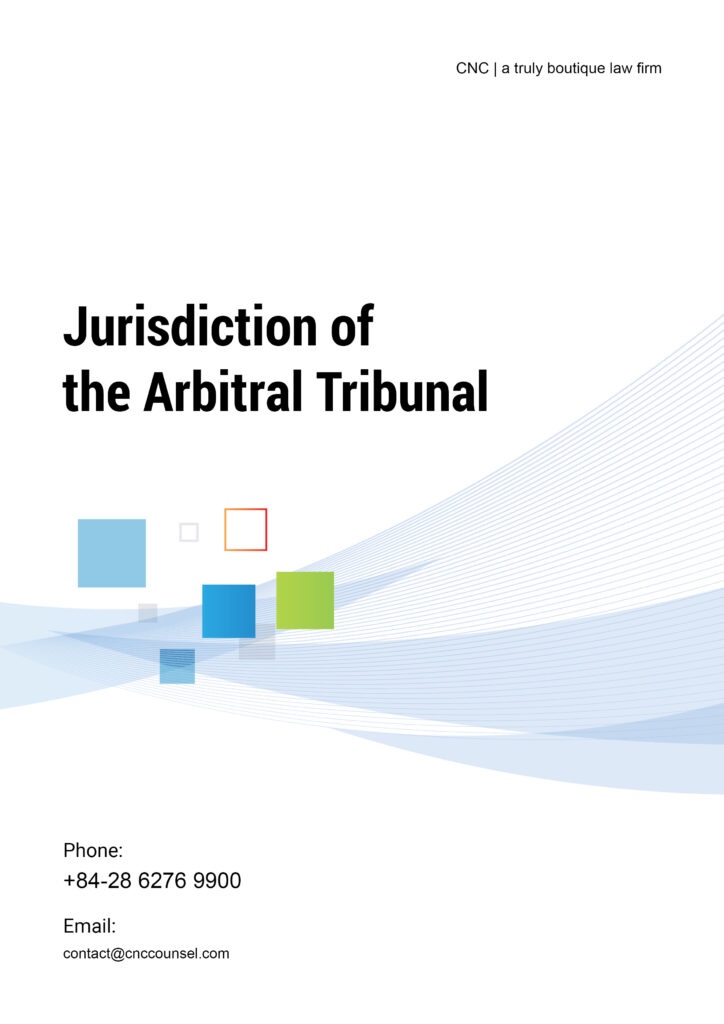Jurisdiction of the Arbitral Tribunal
The jurisdiction of the Arbitral Tribunal plays a decisive role in the resolution of disputes between parties in all arbitration cases. However, cases of Arbitral Award being annulled by the Courts due to Arbitral Tribunals acting outside of their jurisdiction.
To help better understand the legal regulations on the jurisdiction of the Arbitral Tribunal as well as their practical application, CNC is honored to present the article “Jurisdiction of the Arbitral Tribunal” written by Mr. Tran Pham Hoang Tung and his associates
The article “Jurisdiction of the Arbitral Tribunal” is part of the series on dispute resolution via arbitration, which is a method selected by many enterprises upon occurrence of disputes due to their advantages such as prompt and flexible procedures, higher degree of confidentiality in comparison to litigation,
Moreover, the enforcement of dispute resolution result via arbitration is more compulsory than that of negotiation and mediation. Clients might also refer articles on dispute resolution via commercial arbitration and procedures for establishment of Arbitral Tribunal to have a better grasp of (i) Definition of Arbitral Trbinual (ii) distinction between institutional Arbitral Tribunal and ad hoc Arbitral Tribunall and (iii) procedures for establishment of Arbitral Tribunal.
Within the scope of this article, CNC shall provide Clients with necessary information on jurisdiction of the Arbitral Tribunal
Download the PDF file of this article here: [pdf] Jurisdiction of the Arbitral Tribunal
Jurisdiction of the Arbitral Tribunal on Dispute Resolution
In contrast to Courts, Arbitral Tribunals are not considered a legal person[1]. Accordingly, the establishment of Arbitral Tribunal is made for the resolution of a specific dispute and only after the agreement on arbitration as the dispute resolution method by the involved parties has been made. Arbitration is not the default method of dispute resolution if there exist no arbitration agreement between parties, in other words, arbitration is contractual by nature[2] – there shall be no arbitration if there exists no agreement on the employment of this method for dispute resolution.
This means the jurisdiction of the Arbitral Tribunal arises from the wills of disputing parties as it is a prerequisite that parties entrust the dispute resolution to the Arbitral Tribunal. This is entirely different from the jurisdiction of Courts, which originates from the domestic laws as the state empower Courts with adjudicate power. Aside from the entrustment by disputing parties, the laws on arbitration agreement and seat of arbitration are other elements that regulate the jurisdiction of the Arbitral Tribunal. Overall, the jurisdiction of the Arbitral Tribunal is based on the followings:
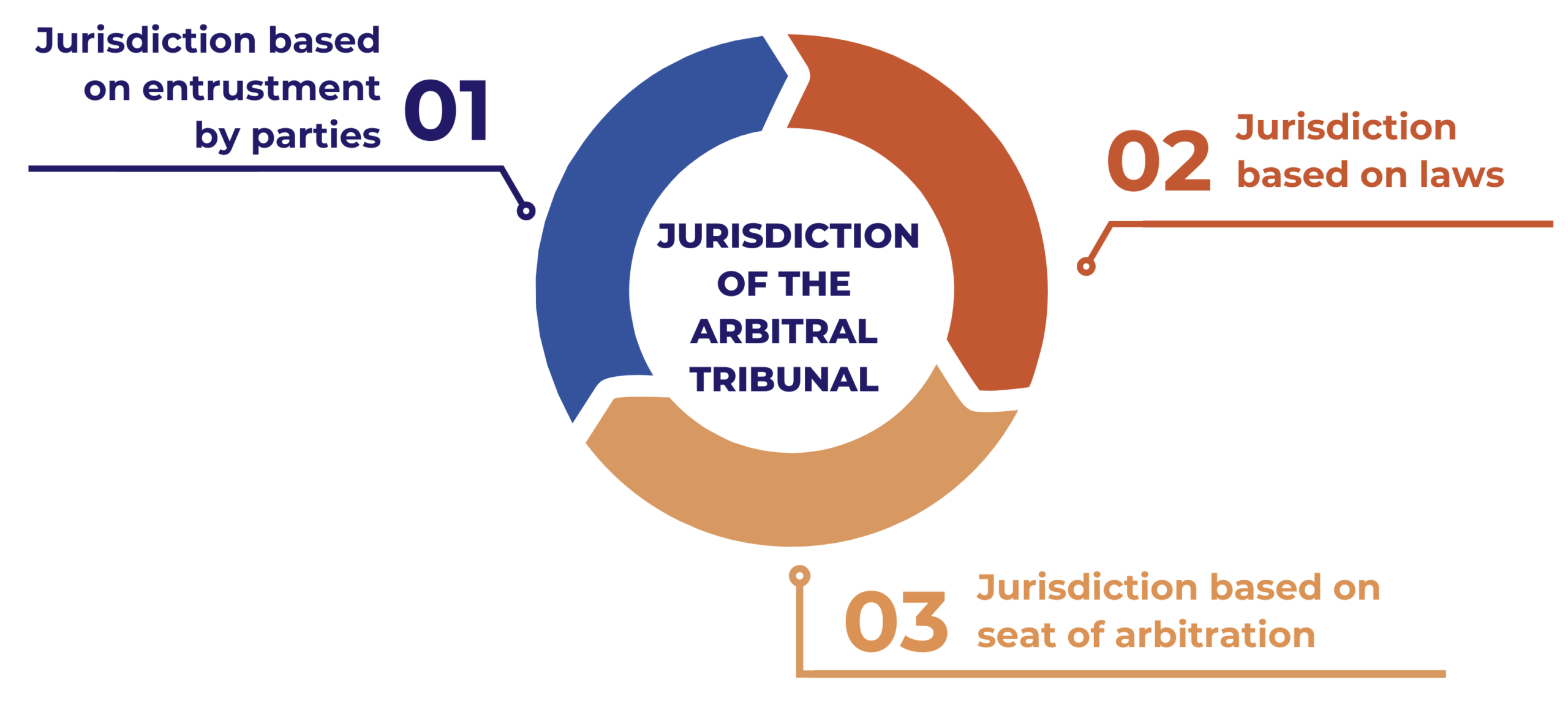
Jurisdiction of the Arbitral Tribunal originates from 03 fundamental sources
Jurisdiction based on entrustment by parties – Grounds for jurisdiction of the Arbitral Tribunal
It is an undeniable fact of dispute resolution via arbitration that the existence of the Arbitral Tribunal depends on the wills of parties. Which is completely different from litigation, where Courts are empowered to exercise adjudicatory power in the name of the state. Meanwhile, cases within the jurisdiction of the Arbitral Tribunal are those brought forward by the disputing parties who have selected either ad arbitration or institutional arbitration as means of dispute resolution
The scope of the Arbitral Tribunal’s jurisdiction shall be specified in the arbitration agreement and the Arbitral Tribunal shall not take action outside of the specified scope. However, if there are discrepancies in the interpretation of the scope of the Arbitral Tribunal’s jurisdiction by the disputing parties, one of the parties might bring the matter to the Court for the determination of whether or not the Arbitral Tribunal act outside of their jurisdiction[3]
Moreover, aside from the powers specified in the applicable law, all of the Arbitral Tribunal’s power is considered to be entrusted by parties via their agreement on the arbitration rules.
Jurisdiction based on the laws
Law on Commercial Arbitration 2010, as the law that governs arbitration proceeding, has given the Arbitral Tribunal some certain powers in the arbitration proceeding even if parties has no agreement on the foregoing
A prominent example of the above would be the determination of applicable law. Accordingly, for disputes with no foreign elements, the Arbitral Tribunal shall apply the laws of Vietnam[4]. For disputes with foreign elements, the Arbitral Tribunal shall apply the laws per parties’ agreement, however, if such agreement does not exist, the Arbitral Tribunal shall apply the law that they deem the most appropriate[5]. Or another example would be the application of international practices to resolve the dispute, provided that such application or the subsequent effect of such application does not contrary to the fundamental principles of the laws of Vietnam[6]
Details on the powers of the Arbitral Tribunal provided for by the laws shall be presented in Section 2 below.
Jurisdiction based on the Arbitral Tribunal’s own judgment
According to Article 43(1) of Law on Commercial Arbitration 2010, prior to evaluating the content of the dispute, the Arbitral Tribunal must first considering about whether or not the dispute is within their jurisdiction. This is an especially important issues if one of the parties challenges the Arbitral Tribunal’s jurisdiction for some common reasons such as: null and void arbitration agreements, infeasible arbitration agreements, noncompliance with dispute resolution procedures (multi-tiered dispute resolution),…
In international arbitration cases, the issues of Arbitral Tribunal’s jurisdiction is often addressed in partial award or interim award. Or in the some less common instances, the Arbitral Tribunal would address the matter in the final award instead of the partial award. The final award is issued at the end of the arbitral proceedings. The final award shall resolve all the outstanding issues, including any matters in relation to the procedures or the content of the cases, even including the cost[7]
In Vietnam, Law on Commercial Arbitration 2010 provides: “Arbitral Award is a decision of the Arbitral Tribunal resolving the dispute in its entirety and end the arbitral proceedings”[8] In other words, in Vietnam, there exist only one kind of arbitral award, which is the final award. Other forms of awards such as partial awards, interim awards or any other kind of awards shall be collectively referred to as decision as provided in Article 3(9) Law on Commercial Arbitration 2010: “Arbitral decision is a decision made by the Arbitral Tribunal during the dispute resolution process”
Specific Jurisdiction of the Arbitral Tribunal according to Law on Commercial Arbitral 2010
Jurisdiction over arbitration agreements (Validity, Feasibility of the Arbitration Agreement or Power of Adjudication)
The Arbitral Tribunal must review the validity and feasibility of the arbitration agreement as well as their power of adjudication over such disputes prior to addressing the content of the dispute[9]
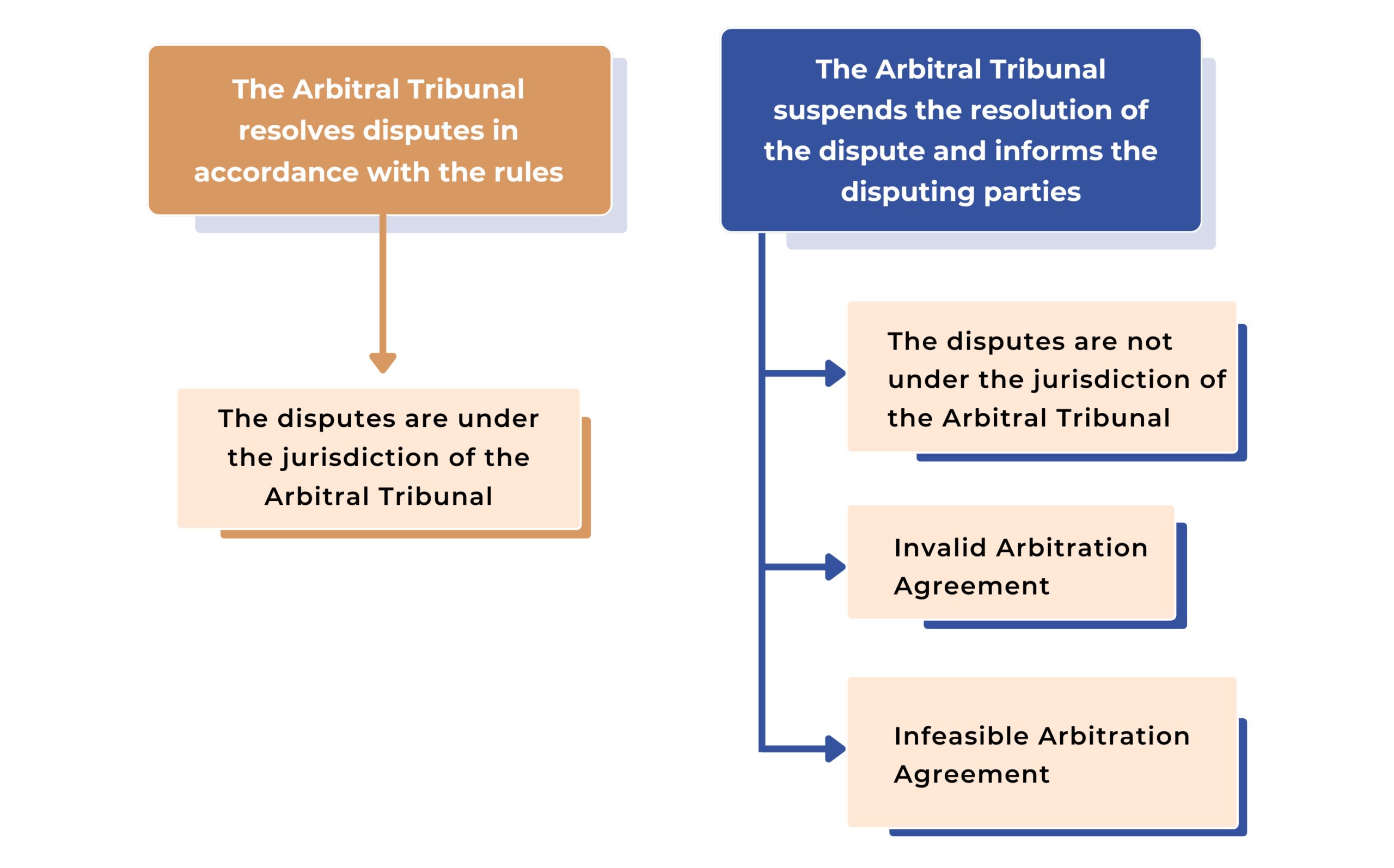
Jurisdiction of the Arbitral Tribunal over arbitration agreements
Jurisdiction over dispute clarification
During the dispute resolution process, the Arbitral Tribunal has the following rights:

Jurisdiction of the Arbitral Tribunal over dispute clarification
The above rights of the Arbitral Tribunal shall be exercised in an appropriate manner and in the presence of the parties or after having informed the parties.[10]
Jurisdiction over evidence collection
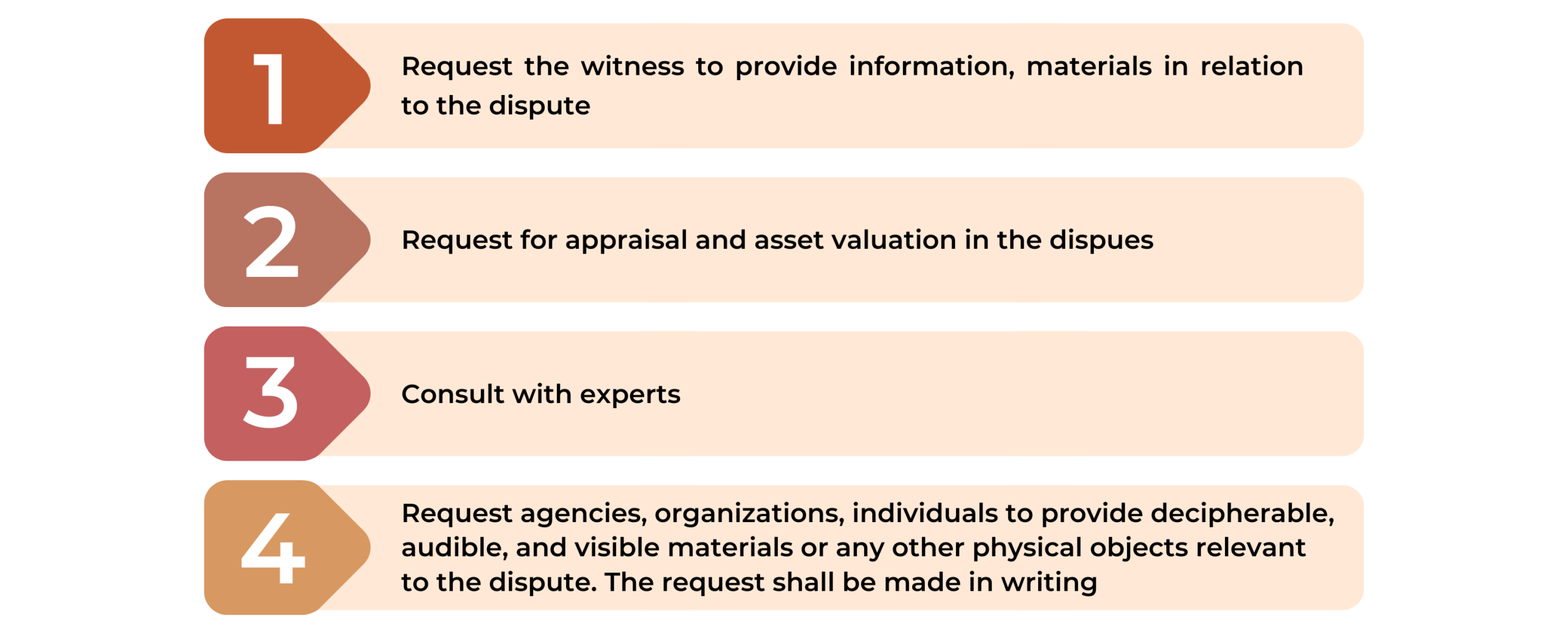 Jurisdiction of the Arbitral Tribunal over evidence collection
Jurisdiction of the Arbitral Tribunal over evidence collection
Jurisdiction over Summon of Witnesses
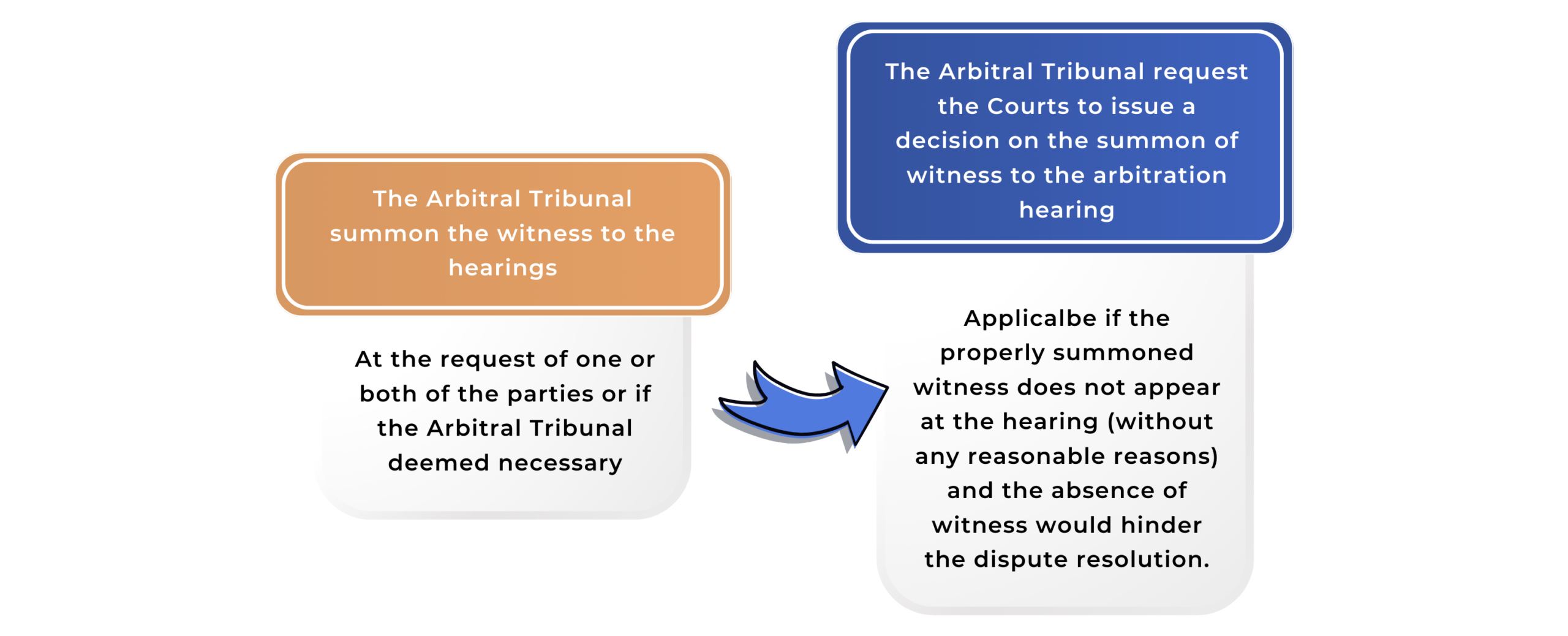
Jurisdiction of the Arbitral Tribunal over summon of witnesses
Jurisdiction over provisional emergency measures
During the dispute resolution process, parties might request the Arbitral Tribunal or Courts to employ provisional emergency measures. However, it must be noted that the request for the Courts to employ provisional emergency measures shall constitute neither a termination of the arbitration agreement nor a waiver of rights to arbitration.
Based on the request of parties, the Arbitral Tribunal might employ one or some of the following provisional emergency measures:
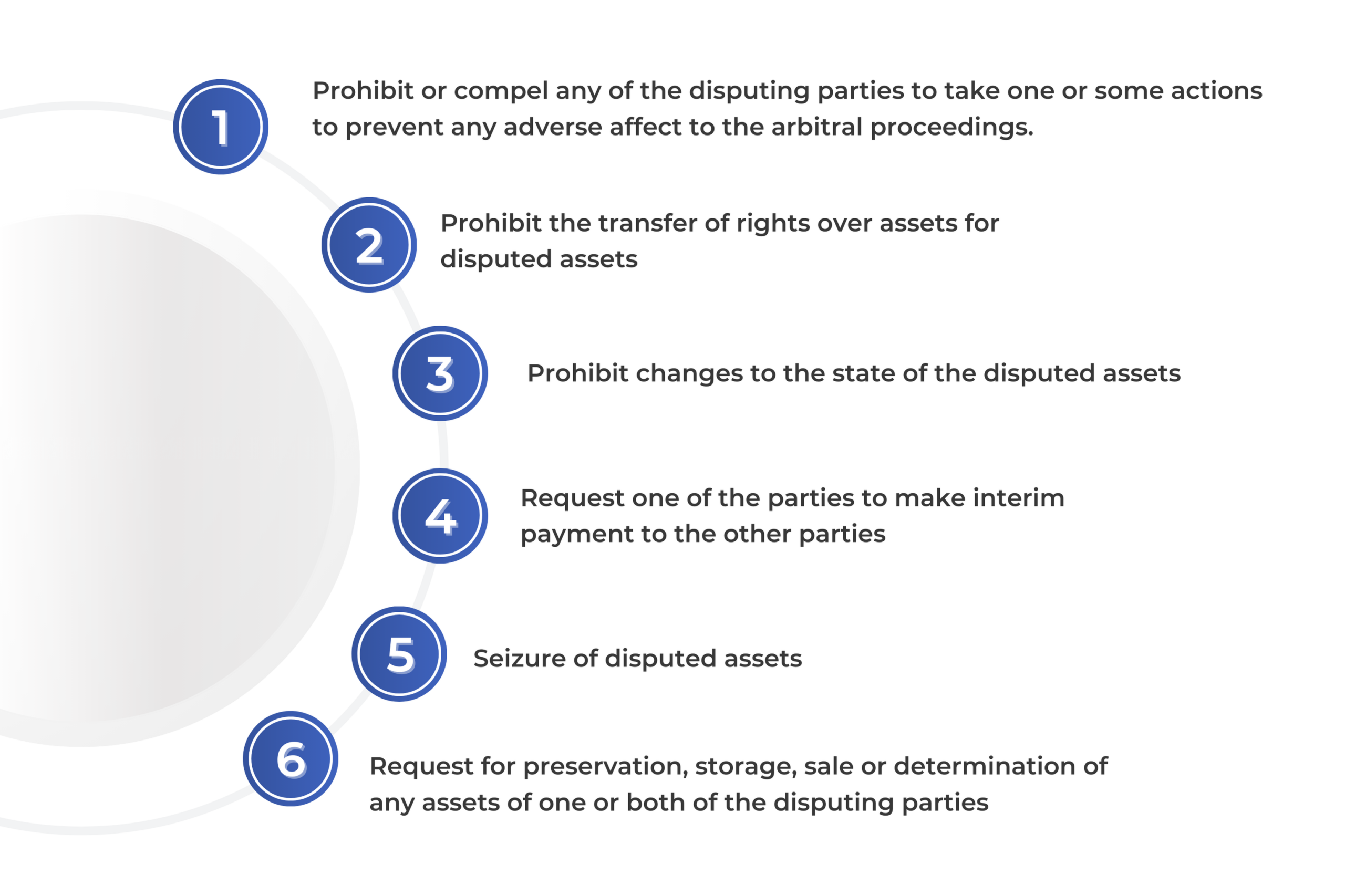
Jurisdiction of the Arbitral Tribunal over provisional emergency measures
Jurisdiction over matters not agreed by parties or not provided for in the Rules of the Arbitration Institution
The Arbitral Tribunal shall decide the time and place of hearings, unless otherwise agreed by parties or provided for by the Arbitration Rules of the Arbitration Institution[11]
Jurisdiction over other matters requested by parties in relation to the dispute
Aside from the above, the Arbitral Tribunal also have the jurisdiction over other matters requested by parties in relation to the dispute such as changes, additions to or withdrawals of provisional emergency measures at any point in time throughout the dispute resolution process[12]; request for hearings without the presence of the parties.[13]
Distinguish the jurisdiction of the Arbitration Institution and Arbitral Tribunal
Despite the Arbitral Tribunal and the Arbitration Institution are two separate entities with different functions. In practice, confusions between the functions of these two entities are not uncommon.
While the main function of the Arbitral Tribunal is to directly adjudicate on the disputes between Parties, the Arbitration institution has the function to organize and regulate activities in relation to dispute resolution via Institutional Arbitration and provide Arbitrators with support regarding administration, office and other necessary support throughout the arbitration proceeding.[14] Furthermore, regarding the initiation of the arbitration proceeding, the Arbitration Institution handle the receipt and review of the request for arbitration. Accordingly, a request for arbitration must contain sufficient contents as specified in Article 30 of Law on Commercial Arbitration, which are the followings:
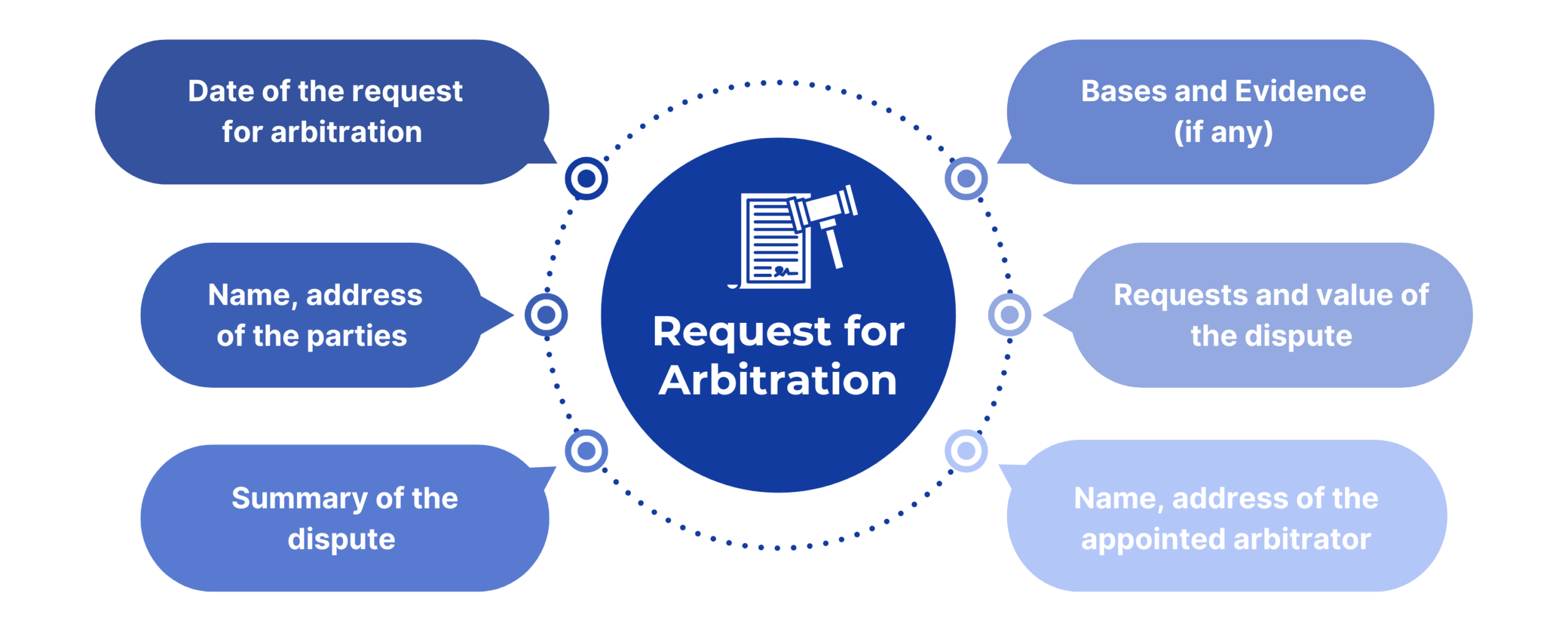
Along with the request for arbitration, the claimant must also have the arbitration agreement, the original or copy of relevant documents.
From the above, it is clear that the main function of the Arbitration Institution is to manage and observe the arbitration proceedings, providing administrative support and other related services for the resolution of dispute. In other words, different from the Arbitral Tribunal, the Arbitration Institution does not have power to adjudicate on disputes.
Conclusion
The determination of the Arbitral Tribunal’s jurisdiction play a decisive role in the resolution of dispute. The supervision of the proceedings conducted by the Arbitral Tribunal, first and foremost, belongs to the disputing parties as parties are entitled to claim whenever they detect that the Arbitral Tribunal’s action go beyond their jurisdiction. In case parties find the decision (regarding the claim) of the Arbitral Tribunal to be unsatisfactory, parties might request the competent court to review the Arbitral Tribunal’s decision.
Therefore, to ensure one’s own interest during the legal proceedings, it is necessary that parties have a clear understanding of the jurisdiction of the Arbitral Tribunal.
———————————
[1] Nguyen Manh Dung, “Thẩm quyền giữa Trung tâm trọng tài và Hội đồng trọng tài trong quá trình tố tụng được phân định như thế nào?“ http://dzungsrt.com/wp-content/uploads/2016/01/07192014-The-Jurisdiction-between-the-Arbitration-Centre-and-the-Arbitral-Tribunal, accesssed on 28/09/2023
[2] See: Duong Anh Son (Lead author), “Giáo trình Luật Hợp đồng Thương mại quốc tế”, 2018, page 194
[3] Referenced materials
[4] Article 14(1) of Law on Commercial Arbitration 2010
[5] Article 14(2) of Law on Commercial Arbitration 2010
[6] Article 14(3) of Law on Commercial Arbitration 2010
[7] Blackaby, Partasides, et al., Redfern and Hunter on International Arbitration (7th ed., OUP, 2023), p. 9.19.
[8] Article 3 (10) of Law on Commercial Arbitration 2010
[9] Article 43(1) of Law on Commercial Arbitration 2010
[10] Article 45 of Law on Commercial Arbitration 2010
[11] Article 54 Law on Commercial Arbitration 2010
[12] Article 51 (1) of Law on Commercial Arbitration 2010
[13] Article 56 (3) of Law on Commercial Arbitration 2010
[14] Article 23 of Law on Commercial Arbitration 2010
———————————
To make any contribution, amendment to the content of this article, or to request CNC for further support, please contact:
CNC© | A Boutique Property Law Firm
The Sun Avenue, 28 Mai Chi Tho, An Phu Ward, Thu Duc City, Ho Chi Minh City, Vietnam
T: (+84-28) 6276 9900 | H/L: (+84) 916 545 618
Disclaimers:
This article is prepared or used for the purposes of introducing or updating clients on the issues and/or developments of legal perspectives in Vietnam. The information presented in this article shall not constitute an advice of any kind and could be subjected to changes without advance notice.



